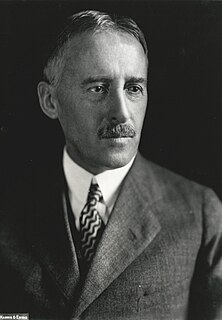
Henry Lewis Stimson was an American statesman, lawyer, and Republican Party politician. Over his long career, he emerged as a leading figure in U.S. foreign policy by serving in both Republican and Democratic administrations. He served as Secretary of War (1911–1913) under President William Howard Taft, Secretary of State (1929–1933) under President Herbert Hoover, and Secretary of War (1940–1945) under Presidents Franklin D. Roosevelt and Harry S. Truman.

James Vincent Forrestal was the last Cabinet-level United States Secretary of the Navy and the first United States Secretary of Defense.

Events from the year 1941 in Canada.

William Daniel Leahy was an American naval officer who served as the most senior United States military officer on active duty during World War II. He held multiple titles and was at the center of all major military decisions of the U.S. during World War II. As fleet admiral, Leahy was the first U.S. naval officer ever to hold a five-star rank in the U.S. Armed Forces. He has been described by historian Phillips O'Brien as the "second most powerful man in the world" for his influence over U.S. foreign and military policy throughout the war.
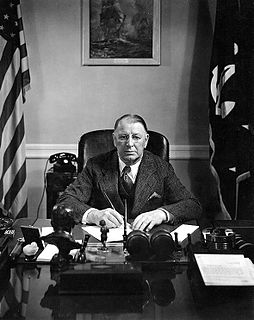
William Franklin Knox was an American politician, newspaper editor and publisher. He was also the Republican vice presidential candidate in 1936, and Secretary of the Navy under Franklin D. Roosevelt during most of World War II. On December 7, 1941, Knox flanked by his assistant John O’Keefe walked into Roosevelt's White House study at approximately 1:30 p.m. EST announcing that Japan had attacked Pearl Harbor. Knox was mentioned by name in Adolf Hitler's speech of December 11, 1941, in which Hitler asked for a German declaration of war against the United States.

Louis Emil Denfeld was an admiral in the United States Navy who served as Chief of Naval Operations from December 15, 1947 to November 1, 1949. He also held several significant surface commands during World War II, and after the war he served as the dual-hatted commander of United States Pacific Command and Pacific Fleet.
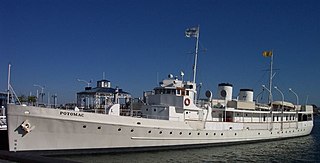
USS Potomac (AG-25), formerly USCGC Electra, was Franklin D. Roosevelt's presidential yacht from 1936 until his death in 1945. On August 3, 1941, she played a decoy role while Roosevelt held a secret conference to develop the Atlantic Charter.

Commodore Dudley Wright Knox was an officer in the United States Navy during the Spanish–American War and World War I. He was also a prominent naval historian, who for many years oversaw the Navy Department's historical office, now named the Naval History and Heritage Command.

William Lockhart "Will" Clayton was an American business leader and government official. Much of his business career centered on cotton trading. He and his three brothers-in-law formed a partnership that grew into the Anderson, Clayton and Company, at one time the world's largest cotton trading company. Politically aligned with the Democratic Party, he opposed some of President Franklin D. Roosevelt's agricultural policies. He repudiated his opposition after Roosevelt's Secretary of State Cordell Hull worked for a reciprocal trade agreement.

John Roy Steelman was the first person to serve as "The Assistant to the President of the United States", in the administration of President Harry S. Truman from 1946 to 1953. The office later became the White House Chief of Staff.

Cary Travers Grayson was a surgeon in the United States Navy who served a variety of roles from personal aide to President Woodrow Wilson to chairman of the American Red Cross.
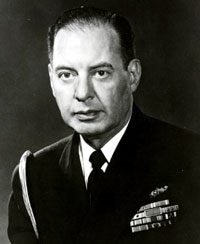
Admiral Robert Lee Dennison was an American naval officer and aide to President Harry Truman.

Harry S. Truman was the 33rd president of the United States, serving from 1945 to 1953. A lifetime member of the Democratic Party, he previously served as a U.S. senator from the state of Missouri from 1935 to 1945. He was chosen as incumbent president Franklin D. Roosevelt's running mate for the 1944 presidential election. Truman was inaugurated as vice-president in 1945 and served for less than three months until President Roosevelt died. Now serving as president, Truman implemented the Marshall Plan to rebuild the economy of Western Europe and established both the Truman Doctrine and NATO to contain the expansion of communism. He proposed numerous liberal domestic reforms, but few were enacted by the Conservative Coalition that dominated the Congress.
The President's Committee on Civil Rights was a United States Presidential Commission established by President Harry Truman in 1946. The committee was created by Executive Order 9808 on December 5, 1946 and instructed to investigate the status of civil rights in the country and propose measures to strengthen and protect them. After the committee submitted a report of its findings to President Truman, it disbanded in December 1947.

Wilson Brown, Jr. was a vice admiral of the United States Navy who served in World War I and World War II. Brown turned 60 in April 1942, making him one of the oldest American naval officers to serve in combat during World War II.
William Norwood Still Jr. is an American maritime historian who was the first director of the program in maritime history at East Carolina University and a noted author of works on U.S. Civil War history and U.S. naval history.

Commodore Byron McCandless was a longtime U.S. Navy officer who was awarded the Navy Cross during World War I and the Legion of Merit during World War II. He was also prominent in the field of vexillology, and helped design two separate versions of the Flag of the President of the United States. He was the father of Bruce McCandless, also a naval officer, and the grandfather of NASA astronaut Bruce McCandless II. Commodore McCandless was later promoted to the rank of Rear Admiral on the retired list.
George McKee Elsey was an American naval commander who was an advisor to Presidents Franklin D. Roosevelt and Harry S. Truman. He also served as a speechwriter and political strategist for Truman during the 1948 election.

Major General Harry Hawkins Vaughan was a senior officer in the United States Army Reserve and a military aide to Harry S. Truman during his time as vice president (1945) and president. He was one of Truman's closest advisors.
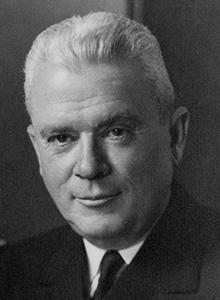
James Kimble Vardaman Jr. (1894–1972) was an American lawyer who served as a member of the Federal Reserve Board of Governors from 1946 to 1958. He was a US Navy captain during World War II, and political aide to President Harry S. Truman. Before the war, he had worked as bank counselor in Missouri.

















